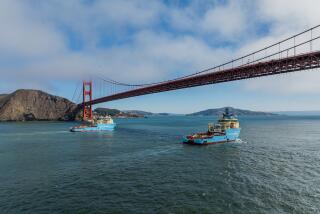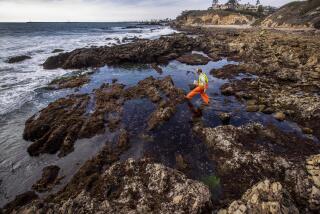Exxon Calls Alaska Cleanup a Success : Oil spill: Despite some crude remaining on once-pristine beaches, its crews are going home.
- Share via
ANCHORAGE, Alaska — Exxon today declared its Alaska oil spill cleanup a success and said it is demobilizing the cleanup crew after a second summer of work, despite some crude oil remaining in the once-pristine environment.
“In general, the shorelines look good,” Exxon cleanup manager Otto Harrison said Tuesday night at the final cleanup operations meeting of the year.
“That does not mean that all the oil is gone or that every bit of shoreline looks good,” Harrison said, predicting that winter storms will pick up where Exxon left off, leaving oiled beaches in better shape when Exxon returns next spring to survey the condition of the shores.
Some work crews were taken off beaches today and all others were to be finished for the year by Friday. Harrison said Exxon will leave a skeleton staff in Alaska over the winter and the company will reopen its Alaska cleanup office next April.
A standing-room-only crowd packed a city auditorium to hear Exxon’s last formal pronouncements about the summer cleanup.
State officials reserved comment and let Exxon have the spotlight during the meeting. Alaska Gov. Steve Cowper scheduled his own news conference for today, but commented that “there’s still a lot to do.”
The tanker Exxon Valdez hit a charted reef in March, 1989, and broke open, spewing nearly 11 million gallons of oil into Prince William Sound and the Gulf of Alaska, coating 1,200 miles of shore with crude, ruining fishing and killing tens of thousands of sea birds, eagles, otters and other animals.
The spill was the worst in American history and triggered the greatest cleanup mobilization ever mounted for an oil spill.
“Everything that could have been done in a sound environmental manner has been done,” Harrison said. “Fishing, tourism and biological restoration have been good in 1990. Debris has been picked up. Tar mats have been removed.”
Harrison noted that fishermen this summer caught a record number of salmon in Prince William Sound. He noted that tourists returned and he said no animals were killed by oil this summer.
However, Harrison acknowledged that, 18 months after the spill, some beaches look worse because Exxon pulled apart storm berms above the high tide line in order to expose buried oil.
More to Read
Sign up for Essential California
The most important California stories and recommendations in your inbox every morning.
You may occasionally receive promotional content from the Los Angeles Times.












